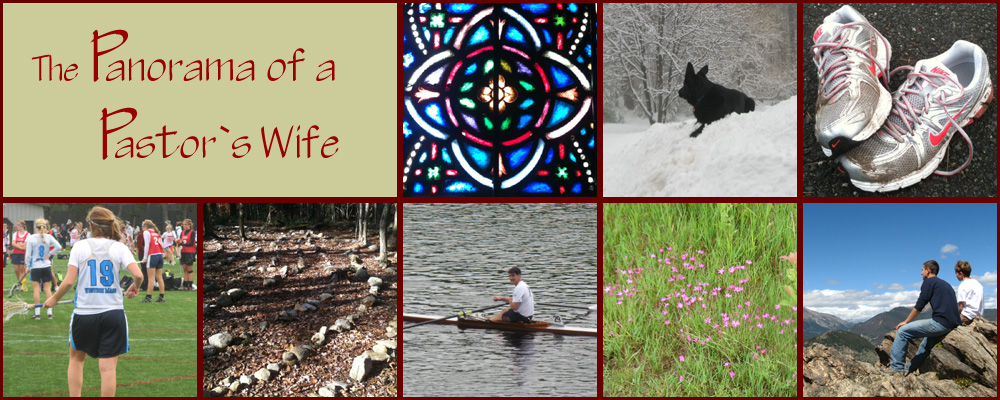Our Vocabularies, Ourselves
So now it’s official: I’m not quite the Bishop’s Wife yet because he’s not quite the Bishop of New Hampshire yet, but I am the Wife (I’ll keep the capital letter, thank you very much) of the Bishop Coadjutor Elect, and – however you call it – the past week has been an unusual one in the life of this family. The flurry of articles in newspapers, as well as the blurbs on local radio and television stations, led to a cascade of well-wishers from all over. For Rob, it’s been overwhelming to hear from so many people from his past – at once heartwarming and also not unlike the feeling of being at his own funeral. (He said it; I didn’t.) The kids and I are proud of the man of our house, soon to be a member of the House of Bishops — or HOB, as I just this evening learned.
Now it’s on to planning how we move (the great unknown, at the moment) and, of course, the next big event, after our daughter’s upcoming high school graduation, that is: the “Consecration” in early August.
And this leads me to the topic of vocabulary: how we expand our lexicon of words and thus expand our minds, and also how we recognize those moments that call out for the absence of words.
During the months when Rob and I were first dating, when he was preparing to return to “the process” and also to divinity school, I learned a whole lot of words I’d never known before. Here are some: “diocese,” “postulant,” “Incarnation,”“liturgy” “diaconate.” They have been common words to many, I know, but not to me – just because of my family background being what it was. I’ve learned additional words from the Anglican tradition since then, too, and they have definitely helped to make me more multi-dimensional. Now, after the election, I can see that still more vocabulary acquisition will be happening. I don’t know about you, but neither the word “consecration” nor the word “episcopate” were bandied about, within earshot anyway, during my formative years. But I’m ready for them now; I have more room in those pockets where other words are safely nestled.
Although it’s true that I was the one needing to catch up in the religious terminology department, my husband had some vocabulary acquisition of his own to do when he sauntered over to my table, so to speak. Here are several of the heretofore unfamiliar words and phrases that he began hearing, due to my upbringing with horses and woods and four older brothers who loved sports and Motown music in equal measure: “Temptations,” “crossing the blue line,” “Wilson Pickett,” “offsides,” “canter,” “and “yellow warbler.” Now some people may say that these words don’t really elevate anyone’s cultural literacy, but I like to think that my husband’s world view was expanded a little bit by taking them in. We cross-fertilized.
 Right now, I’m offering up some vocabulary – plucked from the Poe stories we’ve been reading – to my ninth graders, and it’s been a worthwhile endeavor. In fact, “endeavor” is one of our words. Some of the students are sponge-like in their absorption of new terms; others get frustrated and claim they just can’t retain them.
Right now, I’m offering up some vocabulary – plucked from the Poe stories we’ve been reading – to my ninth graders, and it’s been a worthwhile endeavor. In fact, “endeavor” is one of our words. Some of the students are sponge-like in their absorption of new terms; others get frustrated and claim they just can’t retain them.
I try to gauge what the right pace is for this kind of learning, all the while being more and more convinced – as I watch them work at it – that exposure to new words really can open up new vistas of understanding. Take the word “remorse,” for instance (now there’s a Poe word all right): it’s a little bit guilt, a little bit regret, a dose of sorrow, and generally results in learning that sticks to the ribs. Overall, it’s quite a concept. Or consider a more cheerful one: “humanity.” I really enjoyed listing all the word forms for that one on the board, including its opposite – “inhumanity.” When I can muster my best moments of instruction, I feel as if I just might be helping my students to dive into new pools of meaning, to grasp their own experiences more fully, or – to use one more of our words – “profoundly.”
Today is Memorial Day, a day when we remember the soldiers who sacrificed their lives for their country, they who have fallen silent. Over the past few days, I’ve been thinking of a word we don’t hear much anymore – “valor.” It’s a shining word, really, but it’s faded from use among the 15 year olds I know. Which is not to say that plenty of those same 15 year olds – the ones who need to overcome chronic, grinding problems at home, for instance – don’t demonstrate it all the same.
Amidst all the speeches and parades we recall from Memorial Days past, I think it’s the moments of silence, particularly before and after the playing of “Taps,” that express the feeling of the day best. Sometimes vocabulary of any kind needs to bow down to simple wordlessness to allow full expansiveness of the heart.
I may not be a full-fledged Wife of Bishop yet –wait, will I really change my feathers in any way? — but whatever else goes in the suitcases, my panorama will be quietly coming with me.


Absolutely loved it Polly! Happy to see the face of “The Bishop”.I had to consult my dictionary a couple of times, but I really like learning new words. The Good Sisters of Nazareth drilled that into us and, thankfully, it has become a lifelong habit. I would like to sit in on your classes on Poe. If you are as good at teaching, and I suspect that you are, as you are at writing, those 9th graders are pretty lucky.
I enjoyed this reflection, Polly. Funny, smart, and thought-provoking, as always. Attention to your daughter’s prom dress will now move to attention to a bishop’s attire, and to the collection of new items (and new vocabulary words), such as cope and miter. Life is just so interesting!
I wonder what the acronym is for spouses of members of the House of Bishops — SHOB? HOBS? If there isn’t one yet, you are just the person to create one.